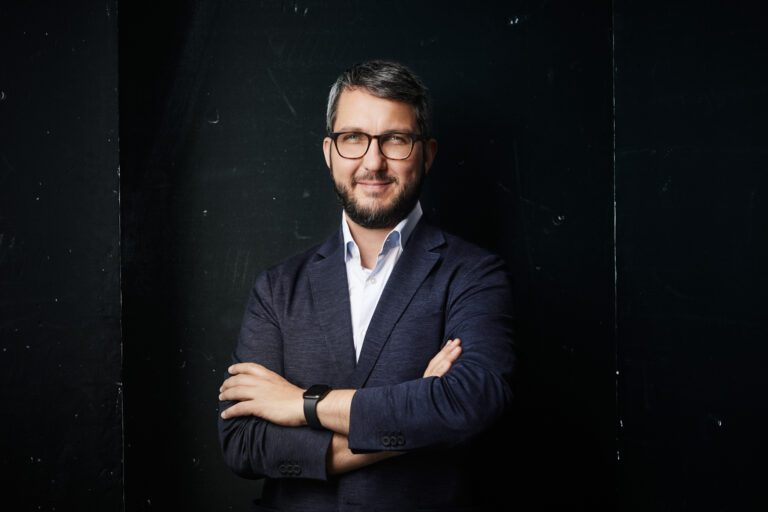Jan Sedlacek is the co-founder and managing partner of Stryber, an acclaimed business growth consultancy and venture builder. Jan combines approaches from the corporate, start-up and strategy consulting worlds in his work and helps established organizations and sovereign wealth funds pioneering new ways to grow business. With his international team, Sedlacek has successfully created and scaled over 100 ventures for his clients.
Company: Stryber
We are thrilled to have you join us today, welcome to ValiantCEO Magazine’s exclusive interview! Let’s start off with a little introduction. Tell our readers a bit about yourself and your company
Jan Sedlacek: Thank you for having me. My name is Jan Sedlacek and I’m the co-founder of Stryber, a strategic business growth consultancy and venture builder stretching its roots across Europe, the Middle East and Asia Pacific.
I started my first company while in high school in Switzerland in the mid-1990s, creating websites for small businesses, which was THE big thing back then. Afterwards, I joined a strategy consultancy. As a young consultant, I was perplexed by how frequently our ideas were poorly implemented. Cost-cutting measures were clear-cut and produced results, mainly by suggesting the number of layoffs needed. Conversely, and to my initial surprise, most growth strategies failed to make a significant impact. From there, I became a C-Level manager at a large, traditional Swiss travel company, which was facing severe competition by the shift towards online booking. We HAD TO innovate, fast. And we failed miserably. The company was eventually dissolved.
After that experience, I joined a start-up aiming to revolutionise the travel agency. Despite building superior technology on a limited budget and achieving significant user growth through viral marketing, we struggled to convert users into paying customers. As an unknown start-up, people hesitated to book expensive trips with us, planning their trips with us, but opting for more established companies to book instead. Ultimately, we ran out of cash and the venture ended. My journey, very bumpy at times, left me wondering how I could combine the speed of execution at start-ups with the resources and solidity of large corps. That’s how Stryber was born, which I co-founded with Alex Mahr, who went through a very similar journey. You could say, our company is the solution to the innovator’s dilemma of large companies.
If you were in an elevator with Warren Buffett, how would you describe your company, your services or products? What makes your company different from others? What is your company’s biggest strength?
Jan Sedlacek: We create new ways to grow, for companies at scale. At Stryber, we challenge our clients, and we don’t execute projects, if we think they make no sense. We deeply believe that strategy and execution need to come from the same hands in order to create accountability. We use our proprietary methodology – of course AI-enhanced – which we have refined and extended with the learnings of hundreds if not thousands of projects. We use it to research and quickly validate venture ideas, and have applied it to successfully build over 100 businesses so far, 100% data-driven and always geared for maximum impact. No buzzwords, no fluff.
What sets us apart? We understand that a business cannot be transformed easily, in fact you only have two options: either you create new business via venture building or expand through mergers and acquisitions. Both ways are very hard, and that’s what we specialise in. No shortcuts to success!
Quiet quitting, The Great Resignation, is an ongoing trend causing many businesses to struggle to keep talent engaged and motivated. Most are leaving because of their boss or their company culture. 82% of people feel unheard, undervalued, and misunderstood in the workplace. In your experience, what keeps employees happy? And how are you adapting to the current shift we see?
Jan Sedlacek: I don’t think that this is a new trend, it’s rather that people are more outspoken about these things today, and are quicker to take action. At the core, it’s a very universal theme; people want to feel that their work has meaning and that their contribution is appreciated. It’s imperative therefore that people know how their contributions align with the company’s goals and see the tangible results of their efforts, which create a sense of purpose and satisfaction. Employees are more engaged when they can develop new skills, take on challenging broader responsibilities, and advance their careers. Providing continuous opportunities for growth and learning is essential. The precondition for that is company growth, in fact a major reason why organic growth is indeed a meaningful strategic goal in itself.
At Stryber, we refer to our team members as ‘Stryborgs’ and always try to also add some fun to our work. We do a lot of team building activities on the side, including an annual global team event in a beautiful location. Finding this intersection between seeking to drive forward productivity and efficiency, whilst keeping team members engaged and making them feel valued, is our way to keep morale high. But as I said, even for us, a prerequisite for this is continued growth. It was also very difficult for us to maintain that spirit in the face of difficult economic environments.
Online business keeps on surging higher than ever, B2B, B2C, online shopping, virtual meetings, remote work, Zoom medical consultations, what are your expectations for the year to come and how are you capitalizing on the tidal wave?
Jan Sedlacek: The digital revolution is reshaping industries at an unprecedented pace – for quite some time now. From e-commerce and remote work to getting medical advice from your doctor, the online world is becoming increasingly central to our lives and businesses. I anticipate this trend to accelerate even further by the advancements in generative artificial intelligence.
However, at Stryber, we aim to demystify AI and focus on practical applications rather than overhyping it as ‘solution for everything’, which it is not. Unlike most of our competitors, we don’t want to sell AI as a silver bullet for business growth and efficiency. We are a pragmatic, results-oriented company that of course leverages AI for tangible business benefits, for many years already. Practically applying AI to improve existing processes is easy, and we’re actually happy to help with that, too, but it’s as hard as ever to build new business, with AI or without. Don’t fall for any promise here, because the difficulty to create new business successfully has never lied in technology, but in strategy and governance.
Business is all about overcoming obstacles and creating opportunities for growth. What do you see as THE real challenge right now?
Jan Sedlacek: The most formidable challenge facing businesses today is the need to balance short-term survival with long-term growth in an era of unprecedented volatility. Economic uncertainty, rapid technological advancements, and shifting consumer behaviours are converging to create a complex and dynamic operating environment. To thrive, organisations shouldn’t only innovate in their core, but also diversify. Business diversification is crucial, especially during a crisis. It reduces risk and balances potential losses.
Our recent ‘Diversification Dividend’ study shows clearly that spreading business activities across different areas drives growth and hedges against market volatility. For example, during the 2008 financial crisis, Amazon launched AWS, creating a new revenue stream that fuelled its growth and stability. Companies that focus only on their core business may see short-term gains but risk long-term decline. Adding new revenue streams through acquisitions or new ventures helps businesses withstand economic uncertainty and ensures lasting growth.
In your experience, what tends to be the most underestimated part of running a company? Can you share an example?
Jan Sedlacek: I think culture is an extremely important aspect of a business at any stage. It’s maybe not underestimated, but misunderstood. I don’t think many leaders get what culture really is, and even fewer how to create it. We have felt first hand, from previous roles, the impact of a dysfunctional or toxic work culture. Therefore, very early on with Stryber, we made a point of clearly writing down our values, which we, the co-founders, believed in as people and for our business. It’s not values we dreamed up, these were our personal values, which we deeply believed in, and never compromised on. As an example, ranked highly amongst our personal values, is honesty – and we have taken a determined approach to create an environment of trust, which encourages our colleagues to always speak out freely, without fear of retribution, and made clear that lies or hiding problems will never be tolerated. One of our own mottos exemplifies this: No politics.
We also recognised the need to hire different profiles of people as we matured as a business, which are true to our core values, but bring additional cultural elements for the changing requirements of the new stage, such as being more procedural. Even as founders of the business, we are constantly challenging ourselves to stay relevant and evaluate whether we are still fitting the changing requirements of the business, at times changing the scope of our own roles, to make sure we are not falling short of offering anything less than the highest standard of work.
On a lighter note, if you had the ability to pick any business superpower, what would it be and how would you put it into practice?
Jan Sedlacek: A magic wand that immediately introduces the right governance structure for the implementation of a company’s growth strategy. Large companies shouldn’t be fooled by an entire industry of innovation shenanigans claiming to “don’t think, just do it”. The right governance is a non-negotiable prerequisite for success! In fact, it’s the number one reason that causes corporate ventures to fail in my experience, even ahead of the lack of a real problem to solve, the lack of product-market fit or even having the wrong team. On the other hand, I’m somewhat glad this magic wand doesn’t exist, because it would also remove our whole business proposition.
What does “success” in 2024 mean to you? It could be on a personal or business level, please share your vision
Jan Sedlacek: Professionally, success equals impact. When it comes to our work with clients, unlike traditional consultancies and venture builders, Stryber stands out by prioritising impact, which cannot be achieved by neither pure strategy nor mere task execution. We always try to drive things to impact, from beginning to end, and that is only possible with a lot of delegation. We challenge clients to pursue meaningful initiatives on the right scale, refusing to settle for anything less. We distinguish ourselves from large strategy houses by maintaining an integrated team of strategists, entrepreneurs, designers, and technologists, allowing for a comprehensive, hands-on execution, glued together by our values.
To me personally, success equals staying motivated in the face of failure. And I’ve seen a lot of that. I can safely say that I’m not the type of person who gives up. I can fail, but I don’t give up, unless I don’t see any further path to growth. I was driven to create Stryber by a vision of combining the best of both the start-up and corporate worlds in a truly impactful manner, based on learnings from many years of trial and error. But throughout those years, I’ve always had this stubborn focus on growth, which helped me get up on my feet after every fall along the way. Growth is the north star I always realign myself to, and also our company and our client work.






